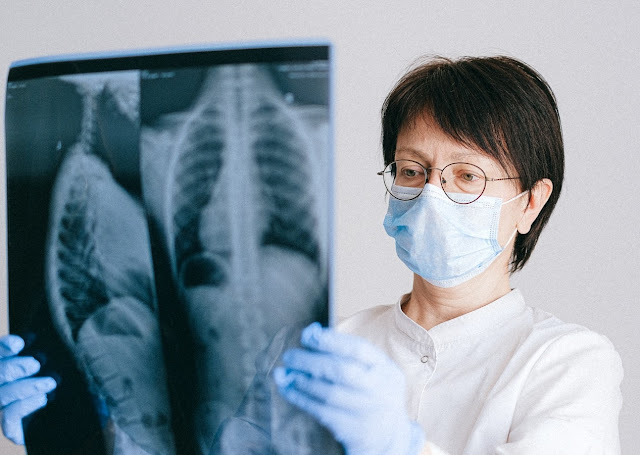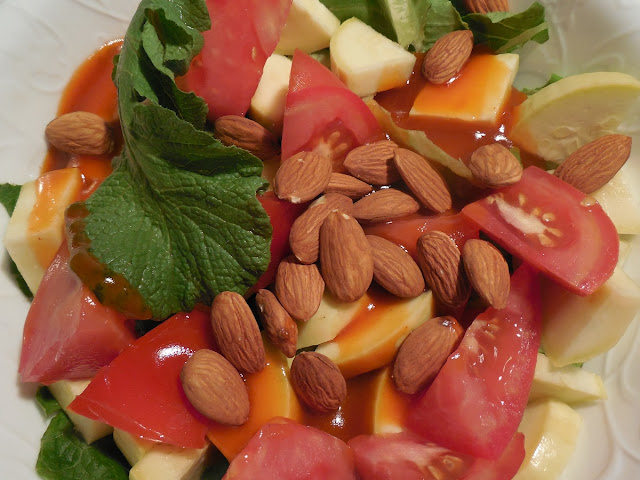Upgrade your Gluten Free Diet to Gain Health Benefits
 |
| Credit: Freepik by @Schantalao |
Although it's enough for most people to avoid gluten, there are other diets that are healthful and can be done gluten free. They may provide more benefits depending on your situation, especially if your diagnosis came too late to prevent a lot of damage.. Keep in mind that the more restricted the diet is, the more careful you have to be to ensure you have a wide range of nutrition in your food. Here are some ideas for how to upgrade your diet.
Vitamins are optional but highly recommended for everyone who is dealing with a deficiency causing disease. I'm an advocate of using organic foods but I also take a daily multivitamin which makes a difference I can feel. I currently take this one, but always make sure your vitamins and supplements are gluten free! If you're new to multivitamins, you might wonder why 'without iron' -- the reason some people take iron separately is because it can cause constipation.
Other diet ideas that are gluten free, or can be:
- There's another gluten free diet, which is less well known and much more limited than the GFD. It's called SCD, the specific carbohydrate diet, and information on it can be found here: http://www.breakingtheviciouscycle.info/home/ You might find it useful if you're also dealing with other issues that seem to be more large-intestine oriented. The theory behind SCD is that certain carbohydrates are more irritating than others to the mucosa and cause it to 'shed.' That's a natural process that happens in everyone, but the theory is, in Crohn's Disease or Ulcerative Colitis, that shedding is too frequent.
- Although the Paleo Diet doesn't focus on avoiding cross contaminated foods, there's no reason why a person couldn't follow it to the gluten free Celiac standard. Robb Wolf is one of the first authors in that diet trend, and there is an even more restrictive AIP Diet which targets inflammation "anti inflammation protocol". By now, with websites like Paleo Mom, it's pretty easy to do gluten free this way. Paleo avoids all grains, not just gluten grains. The theory behind the Paleo diet is that our bodies are more well adapted to whole foods our ancestors ate, and that those foods are the most packed with nutrition anyway. The avoidance of grains and beans stems from the theory of 'anti-nutrients' which a a much debated topic.
- The Ketogenic Diet was the first diet that helped me, it's a more-intense version of the Atkins diet. There is a Keto Vegetarian diet as well, for those who, for religious or moral reasons prefer not to eat meat. But be careful, Seitan is a vegetarian "meat" that is pure wheat gluten! Be sure to double-check how the "meats" are made, or avoid them altogether and stick to eggs, soy and milk for proteins (those three are common allergies though). Dr Westman (a local MD) is author of this Atkins book and together with the other authors, they originated the Ketogenic diet.
- If you suffer from neurological problems, you might want to discuss this diet with your neurologist. Every neurologist I've known has been supportive of the Keto diet for me, but none of them brought it up without me asking about it. Dr. Perlmutter is a well known blogger and neurologist who wrote Grain Brain, an interesting book. The theory behind this diet is that the body can use fat as a fuel just as well as it can use carbohydrates. Some parts of the body benefit from being fat fueled, such as the brain and gut.
- Although I disagree that the Vegan diet is safe, there are some helpful aspects of it for people with Celiac disease or gluten related illness. Some people who react to gluten also have intolerance for milk or other allergens. Since you can be sure there is no milk or egg in anything vegan, and since there is a "certified vegan" label on some foods, this can be helpful in avoiding allergens like milk or eggs. Beware though, a lot of vegan foods contain wheat gluten to provide a "meaty" texture, or can be very high in fiber which can be counterproductive until after healing, for some people. Many vegan foods are triple certified, vegan, gluten free, and organic, though and that can be very helpful.
- The GAPS Diet has been around for a long time (Gut and Psychology Syndrome) and many Paleo ideas were borrowed from either GAPS or SCD, so you might see a similarity. It's a plan for eliminating and then slowly re-introducing problem foods. As long as it's done while avoiding gluten grains and cross contamination, it should be fine for people who are reactive to gluten, including Celiacs. I'm not an expert on GAPS but it seems to be a diet directed at rebuilding the gut mucosa and benefiting the brain's chemistry in a way that helps autism. Not that others can't use it too, it just seems to be the focus.
- The low-FODMAP Diet originated in Australia and spread like wildfire because it solved an aching need for people with idiopathic IBS (irritable bowel syndrome). It turns out that many people with IBS are sensitive to a group of carbohydrates that aren't short like sugar, and aren't long like starch, but somewhere in between. To make matters worse, many remedies for IBS suggest that a person should take these carbohydrates because they are wrongly classified as 'fiber.' For example, many health foods contain inulin which is a FODMAP. If you think you may be sensitive to these so called oligosaccharides, look out for terms like 'prebiotic' in supplements and foods. But the connection to gluten-free is that wheat starch contains a lot of FODMAPS! You can actually trigger IBS in a person with sensitivity to FODMAPS by giving them a slice of wheat bread.
- The Spud Diet - This is for all of you who are thinking, I love my carbs, my beloved carbs! Well, it's ok, some of us just do better on that. This discussion is long but can be a kind of mental detox around diet fads such as "you need lots of protein" no you don't.... "you will get inflammation from carbs" not necessarily... if you don't eat this superfood you wont get this vitamin... etc etc etc... https://youtu.be/-N9HIScjBDg A more varied diet in a similar direction is the Esselstyn or Engine 2 diet. I apologize for the use of "diet" here but some people really do struggle with these things, and nobody in the Spud or Esselstyn communities is selling anything other than a book or two. They're not trying to profit off of your misery.
- The Macrobiotic Diet (Kushi Institute) is a vegetarian diet from Japan. I personally think the most healthy version is pescatarian. Pescatarian means fish and eggs are permitted, but being an Asian diet, it traditionally excludes milk. When the diet became more global, it bowed to local habits and included small amounts of meat and milk so it's not very restrictive like many fad diets. There are several aspects of Macrobiotic that I appreciate.
- First, it introduces a person to seaweed which is high in iodine and other minerals, and can help some people with thyroid issues (but not everyone, so don't bow to too much dogma on that).
- Second, it does not permit anything raw to be eaten because it could challenge the body's ability to fight off common germs in the farming soil.
- Third, the mushrooms most commonly consumed in the US are grown on grains, often gluten grains. The mushrooms most commonly consumed on the Macrobiotic diet are shiitakes imported from Japan, which are traditionally grown only on real wood logs, often wildcrafted in a natural forest far away from gluten grains.
- Many staples in macro cooking are wildcrafted, such as burdock root (which grows wild in some places in the NE of the US). It also excludes milk and many people with Celiac are unable to tolerate milk either because of lactose or casein, or both.
- If you are going to be vegetarian anyway, this is a wonderful way to do that, just be sure your miso is gluten free and find a few online stores that specialize in healthy Japanese imports (see resources page under 'not local, online specialty stores'). Some items are only available seasonally. And be especially careful that your grains come from reputable sources since many of them can be contaminated by grains of wheat or other gluten grains. There is a "purity protocol" for oats that you should be aware of if you eat oats, but it's also a good thing to understand if you base your diet on grains.
There are always new diets coming out. Wheat Belly is a well known book that started out eschewing wheat only, but later became fully gluten free. Whole 30 is yet another in what I call the 'let's make it easier to eat more whole foods' initiatives. It can help a person transition from a processed food diet to a more healthy one, but doesn't specifically avoid gluten cross contamination. The 'easier' part of Whole 30 is the limited time. It can help you rediscover real food if you've been away from it for a while. I read and enjoyed Ultrametabolism by Dr. Hyman, which again isn't fully gluten free but has good advice, based on sound science.
Let's talk about the word 'detox' because you're sure to run into a lot of hullabaloo about that word. Alcohol is a toxin. When people go to rehab, they 'detox' the alcohol's by products from their bodies and especially, the liver. Many foods produce by products that are mildly toxic. The liver just takes care of it. We also have gut flora that, when annoyed, produce toxins, that again, are detoxed by the liver.
A 'detox' diet or even a 'detox' fast, is nothing more than encouraging the liver to speed up stage 1 and stage 2 detox of things your body doesn't need, and help elimination. It's not for fat loss, though sometimes it helps people who are stuck and unable to lose weight. Taking glutathione is part of a 'detox' regimen, so is Vitamin C, Sylimarin, SOD and NAC and many other supplements which, established medical practice says, your body can make on its own without your help.
Except that's not true if you're sick. But because there is so much negativity around detoxing, you might encounter challenges like "show me a toxin" - the simplest one is alcohol. Many 'detox' diets are extreme and their origins are from an abandoned form of medicine called Natural Hygiene. Many doctors secretly like the theory, but can't bring it into practice because they don't control what is or is not official clinical practice. A modern example is Dr. Joel Fuhrman (note he is advocating a pescatarian,not vegan diet).
Most diets fall into categories (a few examples):
- Low fat, I don't mean 30% fat or less, I mean 20% or less, usually 10% or less. Some would call this extreme low fat. But it isn't. This is the definition of low fat, before the 1970's. It usually means limiting your fat intake to 15-25g of fat per day. That's all. There are traditional human diets that eat this way, such as the Tarahumara. There are very few vegan diets that actually reach this low level though. Only Esselstyn and Engine 2/Plant Strong reach down into a low enough fat range to qualify as actually low fat diets today. (that I know of) Almost all other diet plans use added vegetable oils, or make too many concessions. Eating this way is a fundamental change and very high fiber. Let your gut heal first from Celiac, then do this. If you're leaning toward vegan or just very low meat consumption anyway, then this may really help you, but please heal first.
I leaped into the Eat to Live diet, which is nearly a very low fat diet, except it uses too much seed and nut foods to really qualify. I didn't know my gut was already damaged by Celiac. The pain I felt was profound. It was about two years before I was diagnosed. I spent the next two years convinced that vegan was bad for me, that maybe I had Crohn's, and eating keto. Thankfully Paleo-keto did work but it was because it avoided most sources of gluten. If you have any healing left to do, be gentle on yourself at first. Don't overdo anything, not salt, sugar, fat, carb,fiber,protein, or anything.
- lower calories, usually low fat but focuses on calorie counting (DASH, national diets like Nutrisystem, Jenny Craig, etc)
- more whole foods, more green leafy vegetables (whole 30, vegan, vegetarian, pescatarian)
- less carbs (Atkins, wheat belly, whole 30)
- more proteins (Paleo, All Steak Diet, Atkins, pescatarian)
- no carbs, instead, energy is derived from fats (keto)
- different carbs (SCD, low-FODMAP)
- rescue (AIP, Elimination Diet, GAPS, SCD, various 'detox' diets,or water-only fasting for short periods)
When you're healing the most important thing is, NO JUDGEMENT. Eat what feels right. Eat what doesn't trigger bad effects. Listen to your body if it says just to drink water for a day. Etc. Be gentle.
I spent 6 months not fitting my diet into any category when I became gluten free. I even stopped focusing on organic, which I've tried to do with moderate success for most of my adult life. I first found that low-FODMAP helped me, and then Keto was an almost perfect fix. But it wasn't until I strictly cut out gluten that I really started improving. My improvements on other diets were modest and didn't last. Now with a moderate level of FODMAPS, no gluten and organic diet, my health indicators from two years ago are all improved, much improved! My cholesterol is only slightly high, not astronomical, my liver enzymes are once again in the normal range, and, when I'm not having allergies, I feel almost normal again.
Also consider this: Toxic black mold is likely to grow on old wood windows in North Carolina. It eats wood, which is a carbohydrate fiber called cellulose. Cellulose of all kinds is found in fresh fruits and vegetables, as a filler in supplements and certainly in grains and legumes. One reason I think the Keto diet helped me so much on a neurological level is that the mold had no food to live on in my belly. Each year we'd have to clean off the mold from the house, and this year was worse than ever before. If your symptoms come and go mysteriously, check your windows for gray or black splotches. Fighting the mold might help your health a lot.
Many people have said that just gluten free is not enough. It must be a healthy diet that is also gluten free. I agree. Don't stress over it at first, when you're still learning, but later, listen to your body if a food disagrees with you. And take all diet advice with a grain of salt. And don't be too swayed by cries of "evidence based" because not all of it is honest. I came to the independent conclusion that "skeptics" aren't well informed and couldn't be trusted, but Robb Wolf (an author of books on Paleo Dieting) has posted an excellent write up about why we should remain skeptical of skeptics, here. I wish I could've written it as eloquently as that. And he writes in an amusing way too.
The struggle is real, but you're worth it. You should also consider finding a professional dietician who is experienced with t he diet you're interested in. I struggled for decades while everyone dismissed me because I was overweight and then later obese and everyone thought I was just eating too much junk and it was all my fault. That's why I really did try all these diets on my own at one time or another. I was ashamed and afraid I didn't deserve help. Don't let them put you in that cage. Find a professional who will actually help you. Who knows, I might never have startedt this blog if someone 20 years ago had tested me for Celiac.




